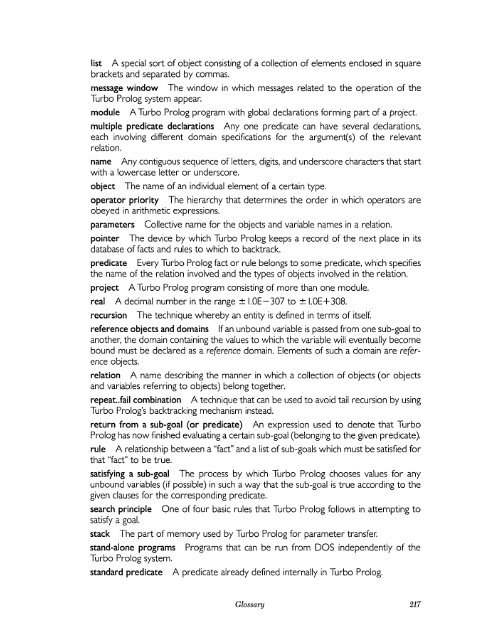Turbo Prolog
Turbo Prolog
Turbo Prolog
You also want an ePaper? Increase the reach of your titles
YUMPU automatically turns print PDFs into web optimized ePapers that Google loves.
list A special sort of object consisting of a collection of elements enclosed in square<br />
brackets and separated by commas.<br />
message window The window in which messages related to the operation of the<br />
<strong>Turbo</strong> <strong>Prolog</strong> system appear.<br />
module A <strong>Turbo</strong> <strong>Prolog</strong> program with global declarations forming part of a project.<br />
multiple predicate declarations Anyone predicate can have several declarations,<br />
each involving different domain specifications for the argument(s) of the relevant<br />
relation.<br />
name Any contiguous sequence of letters, digits, and underscore characters that start<br />
with a lowercase letter or underscore.<br />
object The name of an individual element of a certain type.<br />
operator priority The hierarchy that determines the order in which operators are<br />
obeyed in arithmetic expressions.<br />
parameters Collective name for the objects and variable names in a relation.<br />
pointer The device by which <strong>Turbo</strong> <strong>Prolog</strong> keeps a record of the next place in its<br />
database of facts and rules to which to backtrack.<br />
predicate Every <strong>Turbo</strong> <strong>Prolog</strong> fact or rule belongs to some predicate, which specifies<br />
the name of the relation involved and the types of objects involved in the relation.<br />
project A <strong>Turbo</strong> <strong>Prolog</strong> program consisting of more than one module.<br />
real A decimal number in the range ± I.OE- 307 to ± I.OE+ 308.<br />
recursion The technique whereby an entity is defined in terms of itself.<br />
reference objects and domains If an unbound variable is passed from one sub-goal to<br />
another, the domain containing the values to which the variable will eventually become<br />
bound must be declared as a reference domain. Elements of such a domain are reference<br />
objects.<br />
relation A name describing the manner in which a collection of objects (or objects<br />
and variables referring to objects) belong together.<br />
repeat . .fail combination A technique that can be used to avoid tail recursion by using<br />
<strong>Turbo</strong> <strong>Prolog</strong>'s backtracking mechanism instead.<br />
return from a sub-goal (or predicate) An expression used to denote that <strong>Turbo</strong><br />
<strong>Prolog</strong> has now finished evaluating a certain sub-goal (belonging to the given predicate).<br />
rule A relationship between a "fact" and a list of sub-goals which must be satisfied for<br />
that "fact" to be true.<br />
satisfying a sub-goal The process by which <strong>Turbo</strong> <strong>Prolog</strong> chooses values for any<br />
unbound variables (if possible) in such a way that the sub-goal is true according to the<br />
given clauses for the corresponding predicate.<br />
search principle One of four basic rules that <strong>Turbo</strong> <strong>Prolog</strong> follows in attempting to<br />
satisfy a goal.<br />
stack The part of memory used by <strong>Turbo</strong> <strong>Prolog</strong> for parameter transfer.<br />
stand-alone programs Programs that can be run from DOS independently of the<br />
<strong>Turbo</strong> <strong>Prolog</strong> system.<br />
standard predicate A predicate already defined internally in <strong>Turbo</strong> <strong>Prolog</strong>.<br />
Glossary 217


